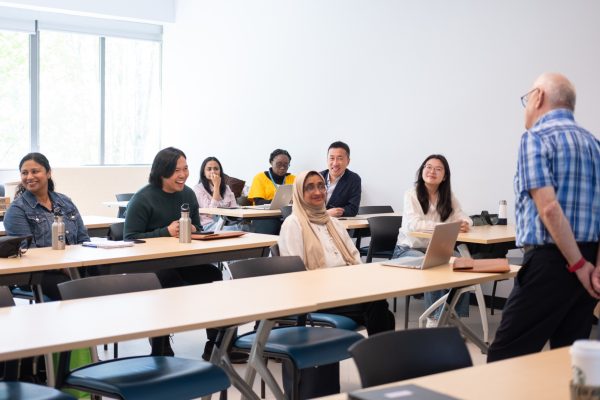What can internationally trained teachers learn from time spent in a Canadian classroom? As it turns out—a lot more than they expected.
Eleven Master of Education (MEd) students from Thompson Rivers University (TRU) recently completed the first round of the Teachers with International Teaching Qualifications (TWINQ) pilot project designed to give international students hands-on experience in B.C. classrooms, familiarize them with the province’s education system and address the teacher shortage, which is particularly dire in B.C.’s Interior region.
Rural and remote communities in B.C., already constrained by limited resources, feel the impact of the teacher shortage more acutely than larger urban centres. TRU’s TWINQ pilot project hopes to help solve this issue. International students enrolled in the TRU MEd program, who already have a Bachelor of Education and/or teaching experience from their home countries, are eligible to apply for the Orientation to Canadian and B.C. Education course offered at the university. Out of over 30 applicants, 11 were selected to participate:

TRU faculty member Terry Sullivan (pictured right) with international Master of Education students.
- Tridipkumar Macwan – India
- Blanca Maposa – Zimbabwe
- Sophia Dsouza – India
- Weilin Ang – Singapore
- John Paul Vallente – Philippines
- Anila Joy – India
- Mehzabeen Abdul Khalique – United Arab Emirates/India
- Shilpa Rodriques – India
- Jiu Zhang – China
- Annette Mary Joseph – India
- Madhu Alwis Thalgaspitiya – Sri Lanka
Last April, this group of graduate students embarked on a four-week in-school experience that included observation, professional development and some classroom teaching. Even though all of the students have credentials and experience teaching internationally, they learned a great deal about the differences teaching in B.C. Students had placements in Williams Lake, Gold Trail and Kamloops, and were connected to homestay placements with teachers in the district.
Aside from the cultural differences, the graduate students identified many variations between classrooms in B.C. and their home countries, including a focus on Indigenous classroom content; the importance of inclusivity; the freedom and responsibility given to students; buddy classes where older students help younger students; the dynamics of split classrooms; the emphasis on hands-on learning; an abundance of outdoor activities; morning announcements led by students; and social and emotional learning as part of the curriculum.
Amid the busy weeks, there were challenges and surprises as well. Some students were apprehensive about how welcoming the schools would be and were pleasantly surprised at the hospitality and warm welcome they received, including a special greeting addressed to them during morning announcements. One class made their guest teacher a book filled with handwritten goodbye notes as a parting gift and gave plenty of hugs on her last day. The students also learned to navigate workplace challenges professionally, with guidance from their instructor, Dr. Terry Sullivan from the Faculty of Education and Social Work, who provided support while they were away on assignment.
School districts involved in the program provided guest instruction during the orientation course on topics such as writing lesson plans, inclusion and special education, curriculum and assessment, and classroom management.
This initiative was a collaborative effort, with many from the TRU community working together to make it a success. Sullivan led the project with support from several members of the Faculty of Education and Social Work, including Dr. Tory Handford, Glenn Borthistle, Mullai Chinnasamy and Candice Nilsen.
The group of 11 students had overwhelmingly positive feedback about their TWINQ experiences and many built networking contacts they hope to use as they seek to become teachers in B.C. With approximately 250 international students enrolled in the TRU MEd program, this pilot has shown there is great reciprocal value for the graduate students and B.C. classrooms in continuing and expanding the TWINQ project.

